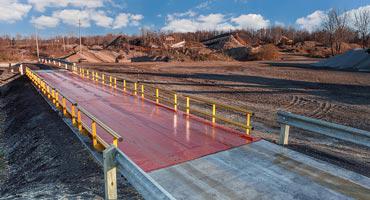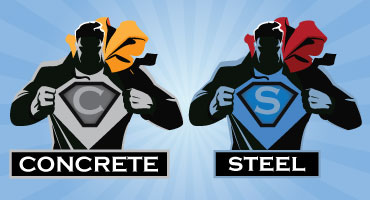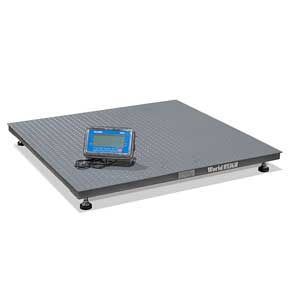The B-TEK Learning Center
Resources to help you scale your business with B-TEK.

In this article, we are going to explore whether it's worthwhile to pay a premium to galvanize your truck scale.
How Different Truck Scales and Truck Weigh Stations Work
Learning How Different Commercial Truck Scales Work
Explore how truck scales work. Learn the difference between multi-platform and axle scales, as well as weigh-in-motion weighing vs. static systems.
Truck scales are a vital part of the logistics and trucking industries. They help calculate weights and prevent overloading. These gross weights are essential to ensure a large truck doesn't surpass its maximum capacity and that truckers out on the road aren't exceeding the legal weight limit of their particular route.
But how do these scale systems work? In this article we'll explore the different components of truck scales, how they interact with each other to deliver weights, and an alternative to installing a permanent truck scale. Read on to learn more about how B-TEK can help.
Truck Scale Components
While the configuration of vehicle scales will vary due to location needs, logistical needs, and the continual improvement of technology, most scales will have some combination of the following parts:
- Weighbridge - The weighbridge is the physical structure where a truck driver pulls their tractor-trailer. Primarily constructed with a concrete or steel deck, these heavy-duty scale components may have ramps and will vary in size depending on the size of the commercial trucks driving across the weighbridge.
- Load Cells - Load cells are the sensors, consisting of strain gauges, that take the weight reading. These components are generally constructed of steel. There are a variety of load cell types. Different types of scales, such as axle scales, portable truck scales, and permanent truck scales, can use different types of load cells. For example, some may use canister load cells, double-ended shear beams, or load cells designed for floor scales. If a truck scale is configured for in-motion-weighing, it will also use different load cells. A grouping of load cells, usually between 6 and 12, is placed between the ground and the weighbridge. Once pressure is applied to the weighbridge, the load cells are compressed, and each cell then sends out a signal, in the form of an electrical current, based on the intensity of the compression.
- Junction Box - The junction box's primary role is to combine all the information from the load cell system so that the operator can see a single vehicle weight rather than the six to twelve weight readings from those individual load cells. Once the junction box combines all the information, the operator can run the raw data through truck scale software to determine the weight of the truck.
How Different Truck Scales Work
There are several types of truck scales, each with its own features and functionalities. Below are the most common vehicle scales you would find at a commercial worksite.
Platform Truck Scales
A platform truck scale is generally a static scale weighing system where the driver pulls up a ramp onto the weighbridges or over a built-in platform to weigh the truck. These scales can only weigh vehicles that have come to a complete stop. Many people are familiar with this type of scale as they have seen them at a farm, quarry, landfill, or as part of a truck weigh station along interstate highways.
Axle Scales
Axle scales are smaller, individual platforms that calculate the weight of a vehicle by driving the truck onto the scale and stopping the first axle onto the scale platforms, then pulling the next axle forward and repeating the process. This scale type is generally used only for checking weights, as axle weighing accuracy tolerances are not narrow enough to meet the NTEP (National Type Evaluation Program) certification standards defined by the NCWM (National Conference on Weights and Measures).
Weigh-in-Motion vs. Static Weighing
Weigh-in-motion is the opposite of a static scale. In a static scale, the truck must come to a complete stop, whereas trucks on a weigh-in-motion scale can keep moving at a slower speed. Both of these methods of weighing a vehicle can be utilized through an axle scale or platform scale but in-motion weighing is most commonly achieved with axle scales. In addition, the weigh-in-motion scale can detect the axle spacing of the truck as is it drives over the sensors and identify vehicles by class, providing a per-axle weight and gross weight. However, while weigh-in-motion weighing is faster, this type of weighing is less accurate than static weighing.
Multi-Platform Portable Truck Scales as an Alternative
For companies that need a scale for short-term projects or have truck- weighing needs that vary throughout the year, a portable truck scale offers an ideal solution. These scales provide a flexible scale that adapts to various situations without compromising accuracy and functionality. For example, Portable Centurion and Hybrid scales come equipped with a full portability frame and two integral-reinforced bulkhead assemblies. The entire structure locks down to secure the weighbridge and the frame together for easy transport without disassembling the load cell mounts. These scales are designed with enhancements tailored to simplify service and calibration, like large top-access covers. Each load cell is accessible for easy installation, calibration, and service.
With a portable truck scale you can avoid the lengthy process of pouring a concrete foundation for a more permanent vehicle scale, allowing you to get the truckload weight readings you need in a greater variety of situations.
How B-TEK Helps Every Step of the Weigh
Our engineers constantly push the envelope to deliver the highest quality weighing systems built to withstand the harshest applications, but it doesn't stop there. We've dedicated our culture to the highest quality, and the results are a level of accuracy that no one can match. On top of that, we offer 90+ years of experience that enables us to focus on innovation and developing ideal truck scale solutions for you, all while our in-house technical and software support help keep your business running smoothly and efficiently.
If you require systems and technical support or have questions about how to choose a scale, scale installation, maintenance, or calibration, don't hesitate to get in touch with us. We're here to help you every step of the weigh.







